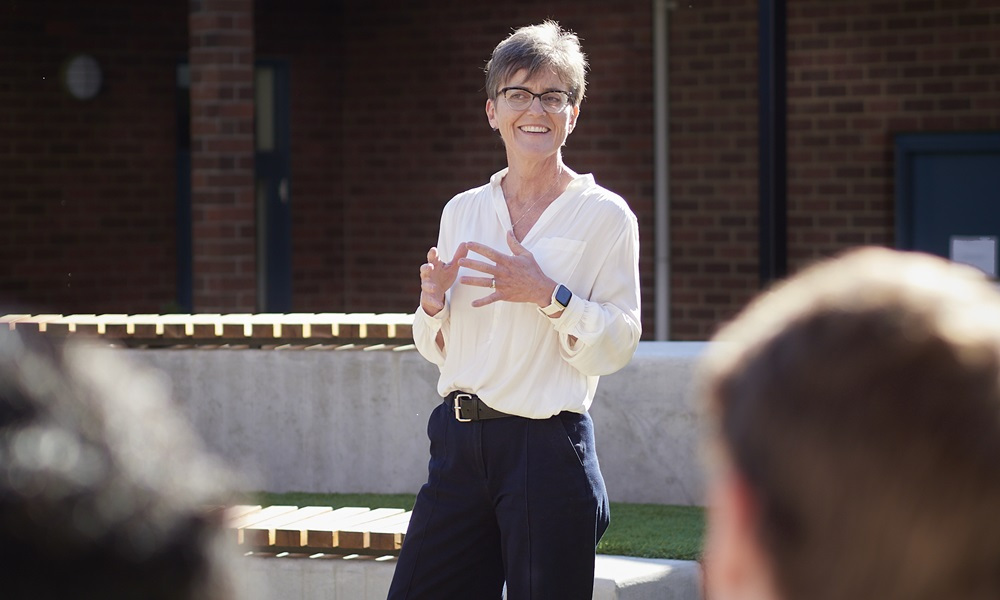‘Being in the classroom can feel quite solitary at times, so creating a meaningful reason to come together was important to me.’ Joy Russell is a teacher at Scotch Oakburn College in Launceston, Tasmania. Earlier this year, she organised a one-day professional learning event with the support of Business Educators Australasia Tasmania that brought together business studies, accounting, financial literacy and economics educators from across the regional city.
In today’s Q&A, Russell explains how the event helped participants build a strong support network, share practical ideas through connections with local business leaders, and take valuable lessons back to their classrooms.
Can you tell me a bit about your career and how you came to be a teacher at Scotch Oakburn College?
After 20 years in corporate banking, I had an opportunity to re-evaluate my career and pursue what really mattered to me. I chose to teach because I wanted to make a real difference to society. Throughout my career, I saw too many young people, especially girls, underestimate themselves or settle for less. I wanted to change that, to empower girls to break barriers, lead businesses, and not accept limits on their potential. That’s why financial literacy is particularly important to me.
I came to teach at Scotch Oakburn after living in Singapore for 4 years, where I qualified as a teacher through Monash University. My first role here was teaching Tasmanian Certificate of Education (TCE) Accounting, and I now teach TCE Economics, TCE Business Studies, year 9 Humanities, and financial literacy electives in years 9 and 10. I also lead the Diversity/Pride Group across middle and senior school, supporting inclusion and amplifying student voice, work that is particularly close to my heart.
Can you tell me about the workshop that you organised with the support of Business Educators Australasia Tasmania?
I organised a one-day professional learning event in May this year at the University of Tasmania’s (UTAS) Launceston campus, with support from Business Educators Australasia Tasmania (BEAT), the Tasmanian branch of the national BEA.
The theme ‘Making Teaching Easier’ focused on helping business educators bring best practice and real-world insights into their classrooms. Sessions aimed to inspire and connect educators through business owners’ stories, financial literacy strategies, and AI integration.
We welcomed teachers from all major Launceston colleges, including one who travelled from Ulverstone, 150 km away! It really created a collaborative and engaged atmosphere.
In a regional town, professional learning can be limited or expensive, often involving flights and high costs. We set out to offer something accessible and valuable for local teachers. Our goal was to make teaching easier by building a strong support network, especially for those new to business and financial literacy. We wanted to share practical ideas through connections with local business leaders and our teaching community.
In terms of your own classroom practice, were you hoping to get inspiration or support in a particular area?
I was looking for fresh ideas to bring into the classroom. Business textbooks and case studies can date quickly, so I wanted fun, relatable content that speaks to teenagers: cutting-edge tech and innovative ideas. I also wanted to share some of the challenges I face and hear how other teachers navigate them. The networking was essential. I hoped to build a core team of educators around me, a trusted circle to exchange ideas and support each other. Being in the classroom can feel quite solitary at times, so creating a meaningful reason to come together was important to me.
What were some of the highlights of the event for you? And can you share some of your key learnings?
One of the most memorable parts of the day was hearing from Lindi McMahon, local councillor and owner of Hope and Me, a charming gift shop that captures the essence of Tasmanian craftsmanship and creativity. She spoke about the resilience required to run a small business. Her insights – such as how interest rates, elections, and competition affect consumer behaviour – gave me contemporary ideas to bring into the classroom.
Business owners Sam Reid (Du Cane, a family-friendly venue celebrating Tasmanian bushwalking culture by serving Tasmanian-brewed beer and wood-fired pizzas in a unique, repurposed camping warehouse space); Madi Biggelaar (Launceston Central), and Lindi McMahon (Hope and Me) showed us that ‘buy local’ is more than a slogan – it is a lifeline for small businesses in regional communities.
Their stories revealed the real struggle of competing with large online retailers, where every dollar spent elsewhere is a missed opportunity for local growth. This insight became a valuable teaching moment in my economics classroom. I connected their experiences directly to our unit on trade, tariffs, and consumer behaviour, helping students understand the real-world impact of spending choices and ethical consumerism.
Another highlight of the event was the exchange of resources among teachers, especially around gamification to engage students in financial literacy. We shared ideas about online games such as Tradle and Stax, and board game strategies using Catan and Monopoly to make learning fun and accessible. These games offer students a hands-on way to explore financial concepts, which is especially useful when energy levels dip at the end of the day.
Since returning to school, what have been some of the practical ways you’ve already been able to put these learnings into practice?
I invited my year 9 Enterprise elective class to enter the Plan Your Own Enterprise competition, a national business planning challenge, which I’d only run with TCE students before. I was surprised that the ideas from the younger cohort were so good – ranging from a learner drive ‘Uber’ concept to AI-enabled fishing rods and flavoured mouthguards. Group work can drift off-task, but this competition gave them purpose, and students engaged deeply with complex business ideas.
At our school, we’ve been struggling to get girls into our Accounting and Economics classes, but our Making Teaching Easier day gave me the tools and confidence to take new action. I organised a 30-minute presentation to year 9-11 students and invited 2 former female students who are now working and studying accounting locally. They spoke to the cohort about budgeting, how it helps them travel, and the value of choosing practical subjects like accounting, where you learn valuable skills like Excel. As role models, they made the accounting subject sound relevant, giving students reasons to enrol in these classes.
At the Making Teaching Easier day, my peers shared how much they wished they’d had access to these resources and conversations when they first started teaching Business. That feedback motivated me to reach out to UTAS and offer support to their Humanities and Social Sciences education pre-service teachers. I presented to this UTAS cohort and shared a range of resources and ideas from the day. It was a great example of how BEAT amplified the day’s impact, creating ongoing value for business educators beyond the room.
Did you collect any other feedback from attendees on how it helped them to improve their practice?
Naomi Hack from St Patrick’s College said: ‘It was a fantastic day, full of practical ideas and insights.’ She used the Du Cane exposure as a springboard for a competitor analysis activity in Business Studies, giving students a real-world focus for their thinking.
One teacher left the Making Teaching Easier day feeling energised and inspired to organise a Business Studies excursion to explore local businesses’ manufacturing processes and marketing strategies. It was a hands-on way to connect theory with the local community.
Several teachers said they are using the stories from the day to inform their case studies and assessment tasks, and they especially loved Tradle. It’s a quick, engaging online game that helps students build economic literacy by guessing countries based on trade data, perfect for sparking curiosity and lifting energy in class.
Bringing people into one room is powerful. We found that teaching financial literacy is fun when concepts are presented through real-world stories and firsthand experiences. Students are more curious, focused, and willing to participate.
Have you considered working with local businesses to make financial literacy more engaging for students? Which gamified tools (like Tradle or Monopoly) could you trial in your classroom to boost engagement with financial concepts?
What professional learning opportunities could you initiate in your local area to share resources and ideas with peers?
How could you better encourage female students to enrol in subjects like Accounting and Economics?



